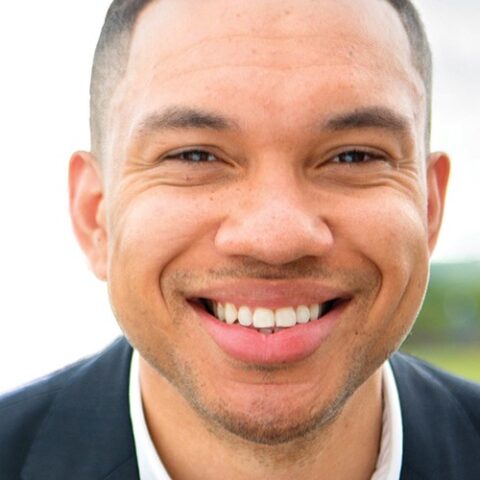Daniel Arukwe Johansen, MPA ’15

“I was able to combine practical experience with coursework taught by professors at the cutting edge of their fields. . . I spent a semester working full-time at the United Nations World Food Programme while earning academic credit. I worked on some of the largest humanitarian emergencies in the world today, including the crisis in Syria—and I was able to see how the theory I learned at Cornell translated into practice. . . Ultimately, this experience led to a full-time job offer.”
Why Cornell? There are a lot of MPA programs around—what made you choose Cornell over other programs you were considering?
When looking at different MPA programs, Cornell clearly stood out. The combination of a flexible curriculum that would allow me to focus on the issues I was most interested in across basically every school, department and discipline on campus, the many opportunities to combine academics with practical hands-on experience as part of the degree, and the world class faculty and reputation of Cornell made Cornell the obvious choice.
What are your long-term career goals? How did the MPA Program help prepare you for these?
My professional and academic focus has been on international affairs and governance and multilateral coordination. In the future, I hope to continue this thread, combining my previous experience with what I’ve learned at the MPA Program to affect global change and formulate international public policy. This work may take me to the United Nations or other multilateral organizations, to a foreign policy think tank where I can conduct further research, or to the public consulting sector where I can work in public policy evaluation and formulation.
The strength of the MPA Program is that it has not only prepared me to meet my personal career goals, but has given me the flexibility to reach them through multiple pathways. Few other programs give you this flexibility. Through the MPA Program, I was able to work directly with the United Nations on issues of humanitarian coordination; I was able to work with one of the top public policy think tanks on international public policy research; and I was able to combine all this with classes with professors who work at the cutting edge of their fields.
What would you say were the top three reasons that the MPA Program was a good fit for you?
I would say that the flexibility and world-class quality of the curriculum, the many opportunities to combine classes with practical real-world experience, and the MPA Program’s tight-knit community that fosters both social and academic enrichment, would be the top three reasons why I enjoyed my time at Cornell so much.
Are there any particular “stand out” experiences at Cornell that made a lasting impact on you?
Perhaps the singular experience that truly defined my time at Cornell was the time I spent in Rome working with the United Nations. Through the Cornell in Rome program, I was able to work full time at the UN World Food Programme headquarters in Rome for a semester while earning academic credits towards my degree. I was assigned to the Emergency Preparedness and Response branch, working on some of the largest humanitarian emergencies in the world today, including the crisis in Syria. I got to experience how the UN works and coordinates globally when disaster strikes, and what the theory I had learned at Cornell looks like in practice. My time at the UN shaped my interests, helped me clarify for myself what I want to do with my post-Cornell career, and was an amazing opportunity to learn from true practitioners of multilateral public policy. It was also an amazing opportunity to make friends and build networks. I used my time in Rome to gather data for my Professional Report, and even got a post-graduation job offer after I got back to Ithaca!
How would you describe the sense of community you find at the MPA Program?
One of the most pleasant surprises when coming to the MPA Program was the sense of true community I found here–one that emphasizes camaraderie over competition, and mutual reinforcement over rivalry. The relatively small size of the program allows you to feel part of a big ‘family’, one group of individuals that work together to get through exciting, but rigorous classes, seminars, projects and presentations. Cornell is a challenging place, but the MPA Program community, and the willingness of your classmates to share both their experiences, their knowledge, and their understandings with you both in and outside of the classroom, makes CIPA a very special place. This sense of community, this sense of being one ‘MPA family’, was key to why I enjoyed my time here so much, both on and off campus. Through the MPA Program, I’ve made friends for life, and I’ve learned the true meaning of teamwork. At the MPA Program students play on the same team, and work together to make the most of their time at Cornell!
Is there anything else about the program, about the opportunities here, or about your particular experience that you would like to share with prospective students?
The MPA program is a challenging, but extremely rewarding program. It requires an awareness of what you want to do and what your goals are, but it also gives you every opportunity to reach them. During my time here, I’ve seen my fellow MPA students exploring and learning from a multitude of disciplines, integrating this diversity into their specific MPA goals. I’ve seen them exploring the world, in a very literal sense, whether through rural development initiatives with the United Nations in Ethiopia, earthquake recovery in Nepal, microfinance in Bangladesh, consulting in New York City, interning on Capitol Hill, or working with state or local government here in the U.S. This diversity is at the core of what makes the MPA Program so special.
